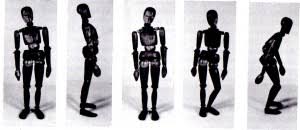Part 1
A client I work with really knows her shit. After a successful film career, she introduced a whole new style of yoga to an entire country (where she was a recent immigrant no less – no prior connections).
Intelligent. Articulate. Got it together.
Yet even though she leads teacher trainings and mentoring groups of her own…
And balances out her yoga practice with weightlifting, martial arts, bouldering, osteopathy, and movement training…
She had terrible anxiety about walking because it caused her so much pain.
And that seemingly simple little thing caused her so much stress, so much grief, and so much doubt. As she transitions into the next stage of her personal and professional evolution, she’s got a lot of hang ups because of it.
I had no idea when we first met.
Truth be told I was a bit intimidated to work with her!
But earlier this week — just a couple of weeks into our work together — I gave her a short lesson about how her heel struck the ground with each step.
And she sent me a voice memo that same night to let me know that for the first time in a looooong time she was able to joyfully walk around town.
No pain.
Just a deep sense of presence and support.
And it was a crystal clear reminder for her that she’d been making things far more complicated than they needed to be (I know that feeling well).
Because of this pain in her walking, she had moved heaven and earth to try and find a solution, looking at every possible intervention…
Except for walking itself.
Just another example of the big life lessons that the body can teach. Sometimes those little nagging problems aren’t merely biomechanical…they’re hints at bigger picture, existential-grade problems.
Make no mistake: the body will communicate with you.
It’ll nudge you every now and then, and if you ignore it, it’ll start screaming. Then — sadly — it may completely numb out.
Take some time. Listen as best you can. And when a challenge does arise, approach it with curiosity and care, rather than tamping it down or running headlong in the opposite direction.
Part 2
I’ve had a few calls working with someone new, someone who — from the outside — is wildly successful.
Young, smart CEO of an international brand doing incredibly well in a very crowded market.
And yet…
(There’s always a plot twist, isn’t there?)
She’s been dealing with stabbing back pain for the past couple of years…
And feels like an old lady because of it.
Now this is challenging for a few reasons:
1) Pain sucks.
2) Not only does pain suck, but it clouds your ability to think effectively. In fact it’s the oldest, most time-tested signal to STOP thinking and DO something…often something drastic.
3) Because of cultural influences, we’re quick to take on a self-perception of weakness because of it. And this is why we often start numbing it out altogether. We tough it out, “don’t have time for this,” and so on. Or we try EVERYTHING to fix it and feel dirty or bad when none of it works. Cue the shift in self-perception from weakness to fundamentally-flawed-ness.
Not a good cycle.
And as a CEO it’s compounded.
Not only do you suffer from it on a personal level, but also your human suffering can’t help but ripple out into the business…
It’s harder to think strategically (again, long-term planning practically goes out the window with pain)…
It’s easier to lash out at others (makes sense – empathy is a fairly shitty survival strategy when your system thinks you’re potentially in existential threat)…
And the guilt — oh, the fucking guilt — of feeling like you “should have this figured out by now.”
It’s a nasty loop.
Now this particular woman had an interesting experience as we worked.
The first session we did a small bit of movement that lessened her experience of pain within just a few minutes. She got up, felt like a “totally different body,” and went on with her day with some homework.
The next day she was hit with another bout of tension and a huge amount of grief.
We had poked the sleeping giant.
So on our next session I invited her into a funny experiment…
What would it be like to try on the voice of your back? Potentially weird, I know.
And at first it was: I’m fucking pissed off.
But underneath it was: I’m so tired.
I’m tired of stress.
I’m tired of being attacked.
I’m tired of getting smashed.
I’m tired of not being heard.
…you can see how this *might* be about more than back pain, right?
Now I should clarify something because this gets confused A LOT.
This isn’t a matter of talking *to* your body.
It’s a matter of talking *as* your body.
As if — by god — the body was somehow more than meat, more than object, more than passive vehicle of your life. As if the body was somehow fundamentally an aspect of your very self, an aspect with a completely different way of understanding the world than the conscious intellectualization we so often trap ourselves with.
This small shift allowed her to have — if only momentarily — a very different experience of herself. And it’s through those novel experiences that we learn.
Now the work isn’t done…
If anything, she was more frustrated than when we began…
(I’m careful to avoid becoming what a teacher of mine recently called “a pez dispenser of positive experiences”)
But something important has taken place.
She has a profoundly different understanding of herself and how she might participate in her life.
With that understanding she can begin to make new choices.

